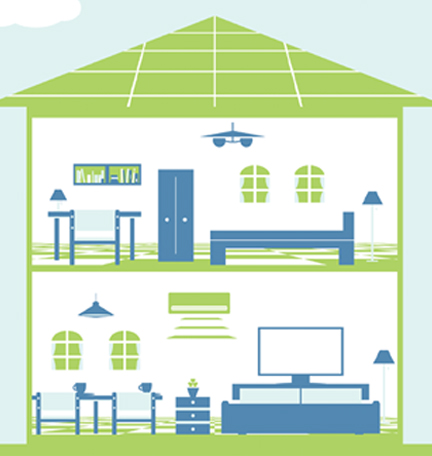Not everyone knows exactly when the next paycheck is coming — or how much that paycheck will be. You might not be able to regularly predict your monthly income, for instance, if you're self-employed, have part-time or seasonal work, or receive occasional cash infusions from bonuses or gifts. An income that varies in timing and amount can make saving and budgeting difficult.
"Many Americans across the income spectrum are affected by issues of income variability," says Darren Easton, Director at Financial Health Network (FHN).
The U.S. Financial Diaries (USFD) study — a joint initiative of NYU Wagner’s Financial Access Initiative (FAI) and the Financial Health Network (FHN) — collected detailed financial data from 235 low- and moderate-income households over the course of a year and found that predicting income is “not easy,” “difficult,” or “very difficult” for 34 percent of Americans. If you’re among them, use these five saving and budgeting tips to leverage the highs and stabilize the lows.
1. Establish Your Expenses
Your income may fluctuate, but many of your bills — your mortgage or rent, car payment, and phone — remain consistent every month. Start by determining your fixed expenses, and then build a baseline budget around them. When you know how much monthly income you'll need for essentials, you can set aside enough money before making other purchases.
Of course not all necessities are predictable. Some, like food, gas, and utilities, vary from month to month. Track these over time to estimate your monthly needs based on a long-term average. You can also call your utility company to ask if they offer budget billing, which is a service that averages the highs and lows of your electric bill across the year so that you pay the a levelized amount each month.
"Looking at your income stream and categorizing your expenses will help you understand where your money's going and figure out the best way to allocate your wages," Easton says.
2. Try Zero-based Budgeting
A zero-based budget means your total income minus total expenses equals zero. To arrive at zero, you have to plan for every dollar you earn.
For example, if you take home $3,000 one month but only have $2,500 in expenses, you must budget what you're going to do with the remaining $500. You might put half toward paying down credit card debt and half toward your vacation fund. Because you start fresh every month — building a new zero-based budget off that month's income and goals — it's an ideal tool for those with variable incomes.
3. Don't Forget to Save
Whatever budgeting strategy you use, include a savings line item alongside the rest of your monthly bills. Especially if your income fluctuates, commit to saving a percentage of your monthly income rather than a set dollar amount. Saving monthly will help you build a floating fund that you can draw from when your income falls and replenish when it rises.
"What's so difficult about income volatility is that expenses are variable, too," Easton says. "So there's a lot of benefit to saving."
4. Stash Budget Surpluses
Want your floating fund to grow bigger, faster? When you receive windfalls — from a tax refund, a gift, or even selling an item you no longer need — resist the urge to splurge. Instead, save. Over the course of a year, even small amounts of unplanned money can add up to large sums that can fill the gaps when your income is low.
"Make the most out of your income spikes to help you weather eventual dips," Easton says.
5. Leverage Prepaid Cards
To help stay on budget, consider using a prepaid card. Once you've established how much money you need to cover monthly expenses, you can load your prepaid card with that amount and deposit the rest in savings.
"Prepaid cards make it easy for people to budget," Easton says.
At the end of the day, you can't control your income, but you can control how you allocate it. Doing so thoughtfully and deliberately can make a clear and steady path out of financial peaks and valleys.










